七下 Unit 6 I'm watching TV.知识点复习课件(共27张PPT)
文档属性
| 名称 | 七下 Unit 6 I'm watching TV.知识点复习课件(共27张PPT) | 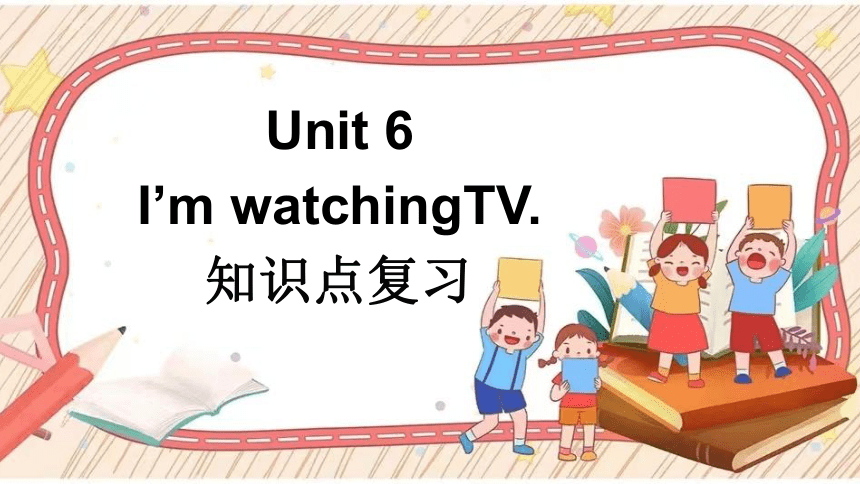 | |
| 格式 | zip | ||
| 文件大小 | 743.5KB | ||
| 资源类型 | 教案 | ||
| 版本资源 | 人教新目标(Go for it)版 | ||
| 科目 | 英语 | ||
| 更新时间 | 2023-04-06 11:30:58 | ||
图片预览

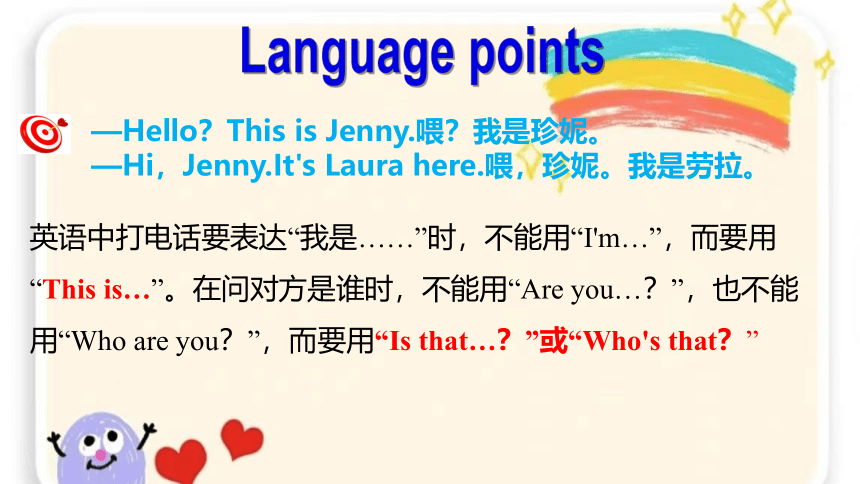
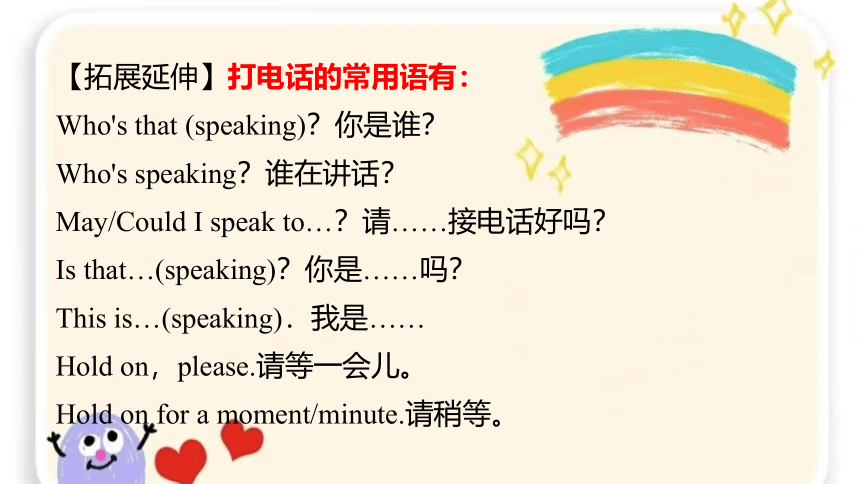
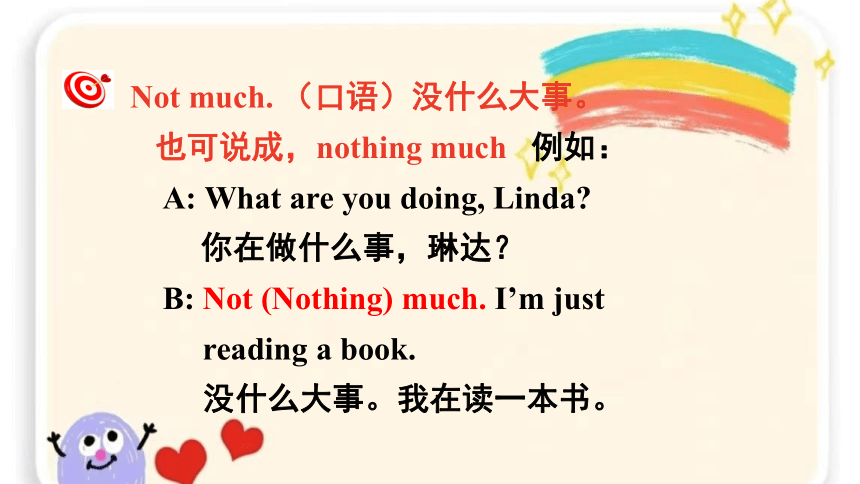
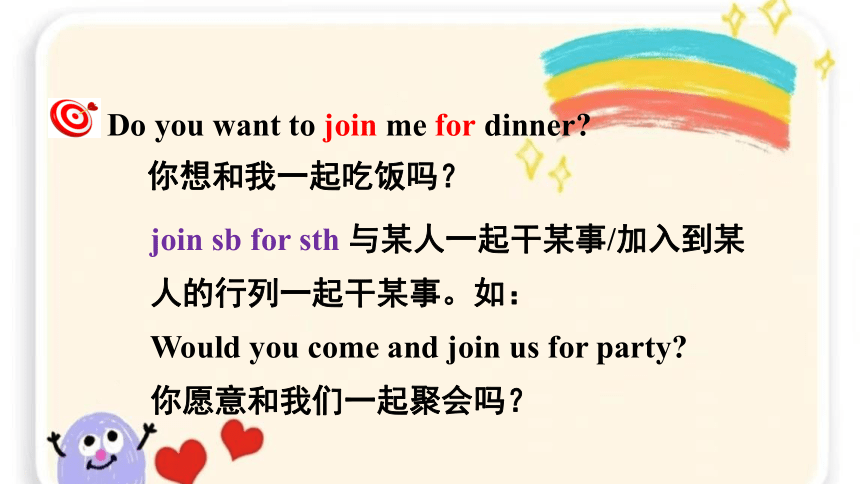
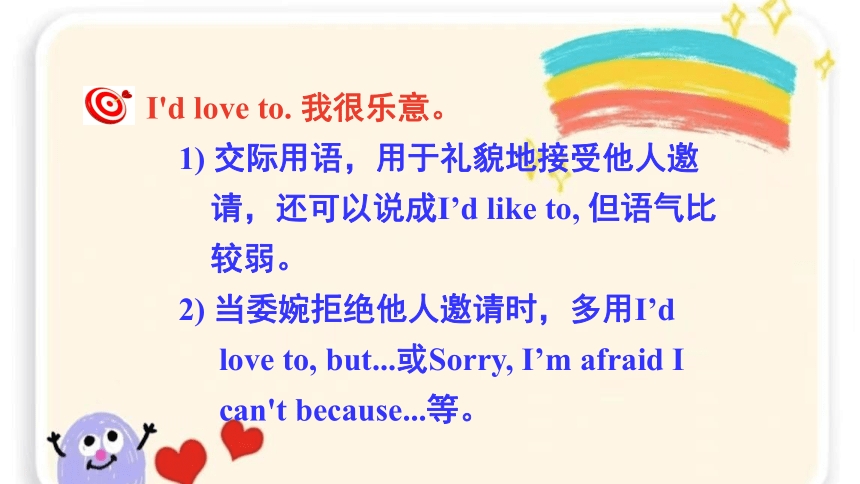
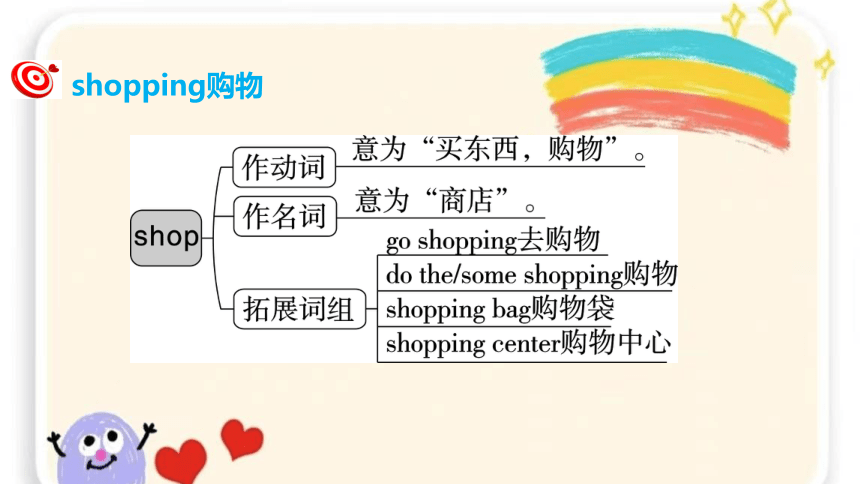
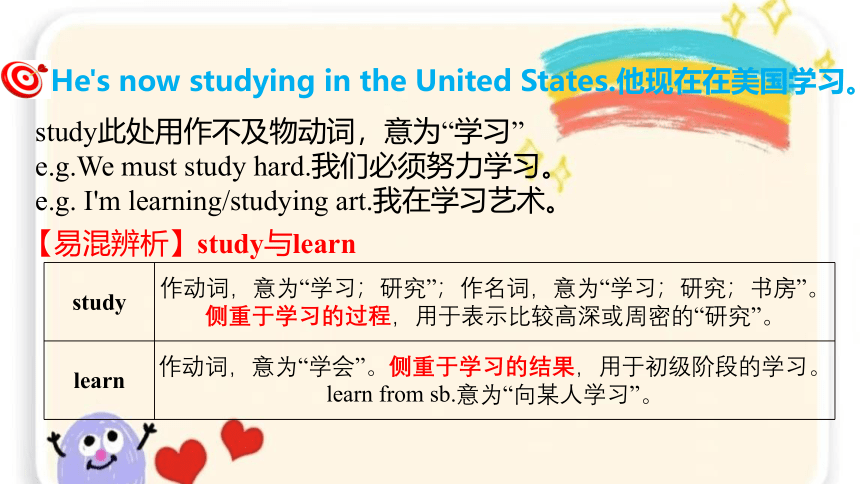
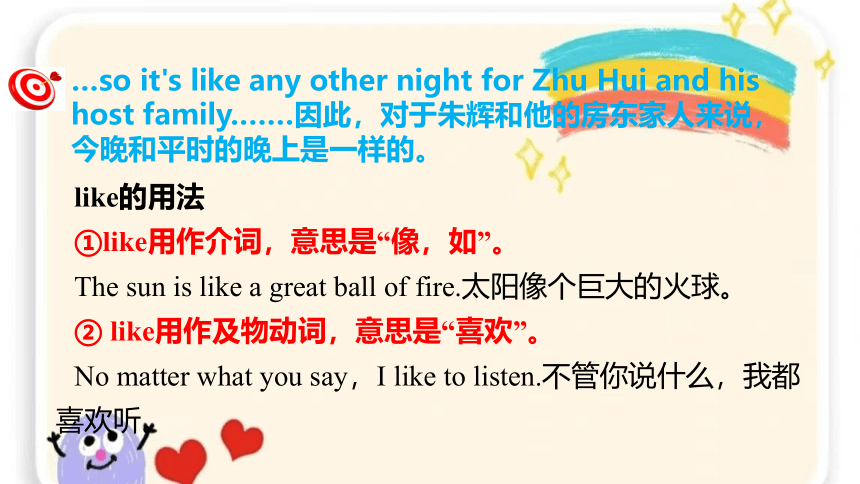
文档简介
(共27张PPT)
Unit 6
I’m watchingTV.
知识点复习
—Hello?This is Jenny.喂?我是珍妮。
—Hi,Jenny.It's Laura here.喂,珍妮。我是劳拉。
英语中打电话要表达“我是……”时,不能用“I'm…”,而要用“This is…”。在问对方是谁时,不能用“Are you…?”,也不能用“Who are you?”,而要用“Is that…?”或“Who's that?”
Language points
【拓展延伸】打电话的常用语有:
Who's that (speaking)?你是谁?
Who's speaking?谁在讲话?
May/Could I speak to…?请……接电话好吗?
Is that…(speaking)?你是……吗?
This is…(speaking).我是……
Hold on,please.请等一会儿。
Hold on for a moment/minute.请稍等。
Not much. (口语)没什么大事。
也可说成,nothing much 例如:
A: What are you doing, Linda
你在做什么事,琳达?
B: Not (Nothing) much. I’m just
reading a book.
没什么大事。我在读一本书。
Do you want to join me for dinner
你想和我一起吃饭吗?
join sb for sth 与某人一起干某事/加入到某人的行列一起干某事。如:
Would you come and join us for party
你愿意和我们一起聚会吗?
I'd love to. 我很乐意。
1) 交际用语,用于礼貌地接受他人邀
请,还可以说成I’d like to, 但语气比
较弱。
2) 当委婉拒绝他人邀请时,多用I’d
love to, but...或Sorry, I’m afraid I
can't because...等。
shopping购物
He's now studying in the United States.他现在在美国学习。
study此处用作不及物动词,意为“学习”
e.g.We must study hard.我们必须努力学习。
e.g. I'm learning/studying art.我在学习艺术。
study 作动词,意为“学习;研究”;作名词,意为“学习;研究;书房”。侧重于学习的过程,用于表示比较高深或周密的“研究”。
learn 作动词,意为“学会”。侧重于学习的结果,用于初级阶段的学习。learn from sb.意为“向某人学习”。
【易混辨析】study与learn
…so it's like any other night for Zhu Hui and his host family.……因此,对于朱辉和他的房东家人来说,今晚和平时的晚上是一样的。
like的用法
①like用作介词,意思是“像,如”。
The sun is like a great ball of fire.太阳像个巨大的火球。
② like用作及物动词,意思是“喜欢”。
No matter what you say,I like to listen.不管你说什么,我都喜欢听。
any的用法
【易混辨析】some与any
some 用于肯定句或表示征求意见,希望得到肯定回答的疑问句中。
any 一般用于疑问句或否定句中。
so it’s like any other night for Zhu Hui and his
host family.
any other night 意为 “任何一个其他的夜晚”
这里的 any 表示“任何一个/任意一个”
any other… 表示“任何别的……;任何其他
的……”
如:
Any other student in the class can play with you.
班里的任何一个同学都可以和你玩。
other的用法
other在句中作形容词,意为“另外的;其他的”,后接名词或代词。other也可作代词,表示“另外的人(或物)”。
【易混辨析】other,the other,others,the others与another
other 意为“别的(泛指)”,可修饰名词。
the other 意为“另一个(特指,两者中的另一个)”。one…the other…一个……,另一个……
others 意为“其余的;别的(泛指)”,表示除去一部分后的另一些,但不是剩下的全体。some…others…一些……,另一些……
the others 意为“其余的;别的(特指)”,指一定范围内除去一部分后,剩余的全部人或物。
another 意为“再一个;另一个(泛指三者或三者以上的人或物中的另一个)”。one another(=each other)相互;another time改天。
Zhu Hui misses his family and wishes to have his mom's delicious zongzi.朱辉想念他的家人,希望吃到母亲做的美味粽子。
miss在此意为“怀念;想念”。
【拓展延伸】miss作动词,还有“漏掉;错过(机会)”的意思。
wish的用法
…but there’s still “no place like home”. 但是“千好万好还是不如自己的家好”。(金窝银窝不如自己的狗窝。)
还有一句谚语:
East, west, home is best.
现在进行时
定义:表示现在(说话瞬间)_______________的动作
eg: The students are listening to the teacher.
He is watching TV now.
2. 结构:
be动词(am, is, are)+ __________
正在进行或发生
V-ing
eg: He is reading a book.
I am writing.
They’re eating.
判断词:now,
look, listen等
be 随着人称、数的变化而变化
3. 动词-ing 变化规则:
1) ___________________
play----playing watch----watching
2) _________________________
take----taking come---coming
3) _________________________________________
_______________________
run----running swim----swimming
4) ______________________
die---dying lie----lying
重读闭音节三要素:
1. 必须是重读音节;
2. 最后只有一个辅音字母;
3.元音字母发短元音
一般情况加-ing
以不发音e 结尾,去e加-ing
重读闭音节结尾的动词,末尾只有一个辅音字
母,双写辅音字母再加-ing
-ie结尾变成-y再加-ing
2)否定句:________________
I am writing.
I am not writing.
4. 现在进行时的句式
1)肯定句:__________________________
I am reading a book.
3)一般疑问句: ________________
肯定回答: _______________
否定回答: __________________
-Is he reading
-Yes, he is./No, he isn’t.
主语+ be + V-ing + 其它.
直接在be后加not
直接把be提到句首
Yes, 主语+be.
No, 主语 + be + not.
4)特殊疑问句:
疑问词 + be +主语 + 动词-ing + 其他
My mother is cooking dinner in the kitchen.
→ Where is your mother cooking dinner
→ What is your mother doing in the kitchen
→ Who is cooking dinner in the kitchen
句式 结构 例句
肯定句 主语 + be (am, is, are) + v-ing + 其他. He is riding his bike. 他正在骑自行车。
否定句 主语 + be (am, is, are) + not + v-ing + 其他. He isn’t reading the newspaper. 他没在看报纸。
一般疑问句 Be (Am, Is, Are) + 主语 + v-ing + 其他 肯定回答:Yes, + 主语 + be. 否定回答:No, + 主语 + be + not. —Are they playing soccer 他们在踢足球吗?—Yes, they are./ No, they aren’t. 是的,他们在踢。/不,他们没在踢。
特殊疑问句 特殊疑问词 + be (am, is, are) + 主语 + v-ing + 其他 What is she doing 她正在做什么?Where are we going 我们往哪里去?
She ___________________ now, but she often ________________ after lunch.
is washing the dishes
washes the dishes
现在进行时表示此时此刻正在做某事
一般现在时表示经常性的动作
1. swimming, river, are, in, the, they (.)
_____________________________________
2. is, in, what, Beijing, time, it ( )
_____________________________________
3. game, he, watching, TV, is, a, on, basketball (.)
______________________________________
Ⅰ.连词成句。
They are swimming in the river.
What time is it in Beijing
He is watching a basketball game on TV.
Exercises
4. talking, to, is, who, Miss Li ( )
____________________________________
5. in, reading, Linda, is, books, library,
the ( )
____________________________________
Who is Miss Li talking to
Is Linda reading books in the library
1. The boy is _______, but he knows a lot
about science.
2. We learn Chinese, English, math and
some ______ subjects.
3. Look! They are swimming in the ______.
4. The fruit salad tastes __________. I like it
very much.
5. Let’s go to the ______________ to buy
some food for the party.
young
other
pool
delicious
supermarket
Ⅱ.从方框中选择合适的单词并用其正确形填空。
pool, supermarket, other, young, delicious
Ⅲ.根据汉语完成英语句子,每空一词。
1. 约翰和彼得在哪儿踢足球?
_______ are John and Peter ________ soccer
2. 这儿是一张我的全家福照片。
Here is a _______ ___ my family.
3. 你妹妹正在家里做作业吗?
_____ your sister _______ her homework
at home
4. 你哥哥在和谁下国际象棋?
Who is your brother ________ chess ______
Where playing
Is doing
photo of
playing with
Ⅳ. 翻译句子。
1. 他正在跟他的叔叔打电话。
2. 在这张照片里,我和我的妹妹正
在一起看电视。
3. 他父亲跟叔叔正在电视上看龙舟赛。
He’s talking on the phone with his uncle.
In this photo, I’m watching TV with my sister.
His dad and uncle are watching the boat races on TV.
Select one photo or draw a picture of
you and your family or friends and
write a short passage about it.
Unit 6
I’m watchingTV.
知识点复习
—Hello?This is Jenny.喂?我是珍妮。
—Hi,Jenny.It's Laura here.喂,珍妮。我是劳拉。
英语中打电话要表达“我是……”时,不能用“I'm…”,而要用“This is…”。在问对方是谁时,不能用“Are you…?”,也不能用“Who are you?”,而要用“Is that…?”或“Who's that?”
Language points
【拓展延伸】打电话的常用语有:
Who's that (speaking)?你是谁?
Who's speaking?谁在讲话?
May/Could I speak to…?请……接电话好吗?
Is that…(speaking)?你是……吗?
This is…(speaking).我是……
Hold on,please.请等一会儿。
Hold on for a moment/minute.请稍等。
Not much. (口语)没什么大事。
也可说成,nothing much 例如:
A: What are you doing, Linda
你在做什么事,琳达?
B: Not (Nothing) much. I’m just
reading a book.
没什么大事。我在读一本书。
Do you want to join me for dinner
你想和我一起吃饭吗?
join sb for sth 与某人一起干某事/加入到某人的行列一起干某事。如:
Would you come and join us for party
你愿意和我们一起聚会吗?
I'd love to. 我很乐意。
1) 交际用语,用于礼貌地接受他人邀
请,还可以说成I’d like to, 但语气比
较弱。
2) 当委婉拒绝他人邀请时,多用I’d
love to, but...或Sorry, I’m afraid I
can't because...等。
shopping购物
He's now studying in the United States.他现在在美国学习。
study此处用作不及物动词,意为“学习”
e.g.We must study hard.我们必须努力学习。
e.g. I'm learning/studying art.我在学习艺术。
study 作动词,意为“学习;研究”;作名词,意为“学习;研究;书房”。侧重于学习的过程,用于表示比较高深或周密的“研究”。
learn 作动词,意为“学会”。侧重于学习的结果,用于初级阶段的学习。learn from sb.意为“向某人学习”。
【易混辨析】study与learn
…so it's like any other night for Zhu Hui and his host family.……因此,对于朱辉和他的房东家人来说,今晚和平时的晚上是一样的。
like的用法
①like用作介词,意思是“像,如”。
The sun is like a great ball of fire.太阳像个巨大的火球。
② like用作及物动词,意思是“喜欢”。
No matter what you say,I like to listen.不管你说什么,我都喜欢听。
any的用法
【易混辨析】some与any
some 用于肯定句或表示征求意见,希望得到肯定回答的疑问句中。
any 一般用于疑问句或否定句中。
so it’s like any other night for Zhu Hui and his
host family.
any other night 意为 “任何一个其他的夜晚”
这里的 any 表示“任何一个/任意一个”
any other… 表示“任何别的……;任何其他
的……”
如:
Any other student in the class can play with you.
班里的任何一个同学都可以和你玩。
other的用法
other在句中作形容词,意为“另外的;其他的”,后接名词或代词。other也可作代词,表示“另外的人(或物)”。
【易混辨析】other,the other,others,the others与another
other 意为“别的(泛指)”,可修饰名词。
the other 意为“另一个(特指,两者中的另一个)”。one…the other…一个……,另一个……
others 意为“其余的;别的(泛指)”,表示除去一部分后的另一些,但不是剩下的全体。some…others…一些……,另一些……
the others 意为“其余的;别的(特指)”,指一定范围内除去一部分后,剩余的全部人或物。
another 意为“再一个;另一个(泛指三者或三者以上的人或物中的另一个)”。one another(=each other)相互;another time改天。
Zhu Hui misses his family and wishes to have his mom's delicious zongzi.朱辉想念他的家人,希望吃到母亲做的美味粽子。
miss在此意为“怀念;想念”。
【拓展延伸】miss作动词,还有“漏掉;错过(机会)”的意思。
wish的用法
…but there’s still “no place like home”. 但是“千好万好还是不如自己的家好”。(金窝银窝不如自己的狗窝。)
还有一句谚语:
East, west, home is best.
现在进行时
定义:表示现在(说话瞬间)_______________的动作
eg: The students are listening to the teacher.
He is watching TV now.
2. 结构:
be动词(am, is, are)+ __________
正在进行或发生
V-ing
eg: He is reading a book.
I am writing.
They’re eating.
判断词:now,
look, listen等
be 随着人称、数的变化而变化
3. 动词-ing 变化规则:
1) ___________________
play----playing watch----watching
2) _________________________
take----taking come---coming
3) _________________________________________
_______________________
run----running swim----swimming
4) ______________________
die---dying lie----lying
重读闭音节三要素:
1. 必须是重读音节;
2. 最后只有一个辅音字母;
3.元音字母发短元音
一般情况加-ing
以不发音e 结尾,去e加-ing
重读闭音节结尾的动词,末尾只有一个辅音字
母,双写辅音字母再加-ing
-ie结尾变成-y再加-ing
2)否定句:________________
I am writing.
I am not writing.
4. 现在进行时的句式
1)肯定句:__________________________
I am reading a book.
3)一般疑问句: ________________
肯定回答: _______________
否定回答: __________________
-Is he reading
-Yes, he is./No, he isn’t.
主语+ be + V-ing + 其它.
直接在be后加not
直接把be提到句首
Yes, 主语+be.
No, 主语 + be + not.
4)特殊疑问句:
疑问词 + be +主语 + 动词-ing + 其他
My mother is cooking dinner in the kitchen.
→ Where is your mother cooking dinner
→ What is your mother doing in the kitchen
→ Who is cooking dinner in the kitchen
句式 结构 例句
肯定句 主语 + be (am, is, are) + v-ing + 其他. He is riding his bike. 他正在骑自行车。
否定句 主语 + be (am, is, are) + not + v-ing + 其他. He isn’t reading the newspaper. 他没在看报纸。
一般疑问句 Be (Am, Is, Are) + 主语 + v-ing + 其他 肯定回答:Yes, + 主语 + be. 否定回答:No, + 主语 + be + not. —Are they playing soccer 他们在踢足球吗?—Yes, they are./ No, they aren’t. 是的,他们在踢。/不,他们没在踢。
特殊疑问句 特殊疑问词 + be (am, is, are) + 主语 + v-ing + 其他 What is she doing 她正在做什么?Where are we going 我们往哪里去?
She ___________________ now, but she often ________________ after lunch.
is washing the dishes
washes the dishes
现在进行时表示此时此刻正在做某事
一般现在时表示经常性的动作
1. swimming, river, are, in, the, they (.)
_____________________________________
2. is, in, what, Beijing, time, it ( )
_____________________________________
3. game, he, watching, TV, is, a, on, basketball (.)
______________________________________
Ⅰ.连词成句。
They are swimming in the river.
What time is it in Beijing
He is watching a basketball game on TV.
Exercises
4. talking, to, is, who, Miss Li ( )
____________________________________
5. in, reading, Linda, is, books, library,
the ( )
____________________________________
Who is Miss Li talking to
Is Linda reading books in the library
1. The boy is _______, but he knows a lot
about science.
2. We learn Chinese, English, math and
some ______ subjects.
3. Look! They are swimming in the ______.
4. The fruit salad tastes __________. I like it
very much.
5. Let’s go to the ______________ to buy
some food for the party.
young
other
pool
delicious
supermarket
Ⅱ.从方框中选择合适的单词并用其正确形填空。
pool, supermarket, other, young, delicious
Ⅲ.根据汉语完成英语句子,每空一词。
1. 约翰和彼得在哪儿踢足球?
_______ are John and Peter ________ soccer
2. 这儿是一张我的全家福照片。
Here is a _______ ___ my family.
3. 你妹妹正在家里做作业吗?
_____ your sister _______ her homework
at home
4. 你哥哥在和谁下国际象棋?
Who is your brother ________ chess ______
Where playing
Is doing
photo of
playing with
Ⅳ. 翻译句子。
1. 他正在跟他的叔叔打电话。
2. 在这张照片里,我和我的妹妹正
在一起看电视。
3. 他父亲跟叔叔正在电视上看龙舟赛。
He’s talking on the phone with his uncle.
In this photo, I’m watching TV with my sister.
His dad and uncle are watching the boat races on TV.
Select one photo or draw a picture of
you and your family or friends and
write a short passage about it.
同课章节目录
- Unit 1 Can you play the guitar?
- Section A
- Section B
- Unit 2 What time do you go to school?
- Section A
- Section B
- Unit 3 How do you get to school?
- Section A
- Section B
- Unit 4 Don't eat in class.
- Section A
- Section B
- Unit 5 Why do you like pandas?
- Section A
- Section B
- Unit 6 I'm watching TV.
- Section A
- Section B
- Review of Units 1-6
- Unit 7 It's raining!
- Section A
- Section B
- Unit 8 Is there a post office near here?
- Section A
- Section B
- Unit 9 What does he look like?
- Section A
- Section B
- Unit 10 I'd like some noodles.
- Section A
- Section B
- Unit 11 How was your school trip?
- Section A
- Section B
- Unit 12 What did you do last weekend?
- Section A
- Section B
